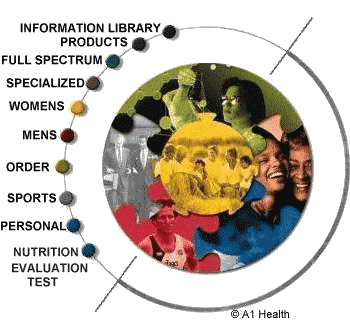Formu-Leane Z | Maxum Force | Sports Toddy
WHY DO WE BECOME FAT?
Before we begin our discussion of the actual management
of body fat, we need to understand why some of us eat constantly and remain
thin as rail, while others seem to gain 2 pounds just 'breathing the fumes'
of a simmering casserole.
The answer s in METABOLISM.
Picture your body as an engine with a more or less
fixed idling speed. This idling or resting rate is called your basil metabolic
rate (BMR), which varies from person to person. Some people have a higher
or faster BMR than others and are thereby able to consume more calories without
storing them as excess fat. Others have a slower resting BMR and burn less
calories overall. Still others seem to have the ability to increase their
BMR during times of greater caloric intake, compensating for the excess calories
without gaining weight.
Individuals who have a slow calorie burn rate and
who don't exercise enough to utilize the fuel from the foods they eat are
known as calorie sensitive - meaning that their caloric intake is exceeding
their output.
These individuals respond well to a dietary program
that restricts their calorie intake to match their calorie output. These individuals
usually lose weight rather quickly upon reducing calories and generally are
not more than 10 to 25 pounds overweight.
The weight gain in these cases, usually occurs after
the age of 35 due to a slowing of the metabolism for which the dietary intake
has been altered or adjusted accordingly. If these symptoms describe you,
you are likely a calorie sensitive individual and need to proceed to that
section of this page.
For many thousands of people mere calorie excess
alone does not account for their weight problem. They have further metabolic
disturbances which revolve around two problems, hyperinsulinism and insulin
resistance. Left unchecked, these two problems lead not only to excessive
weight gain but also to other blood sugar related conditions such as hypoglycemia,
adult onset diabetes and a far greater incidence of heart disease, stroke
and hypertension.
During 25 five years of practice in the nutrition
field, I have found that more grossly overweight people (those with more than
30 pounds excess body fat) respond poorly to low calorie diets than those
who respond well. This is because they are generally not calorie sensitive
but rather carbohydrate intolerant.
These individuals lose weight with great difficulty,
even on low calorie diets. (It is not uncommon for these people to go on a
1500 calorie diet and in spite of following it perfectly, not lose more than
1 or 2 pounds per month - or worse yet lose no weight at all for months at
a time!)
 How can
you tell for sure if you are carbohydrate intolerant? (NEXT)
How can
you tell for sure if you are carbohydrate intolerant? (NEXT)
Related Articles

Information Library|
Products|Full Spectrum|Specialized|Womens|Mens|Order|Sports|Personal|
 e-mail: info@colloidal-min.com
e-mail: info@colloidal-min.com